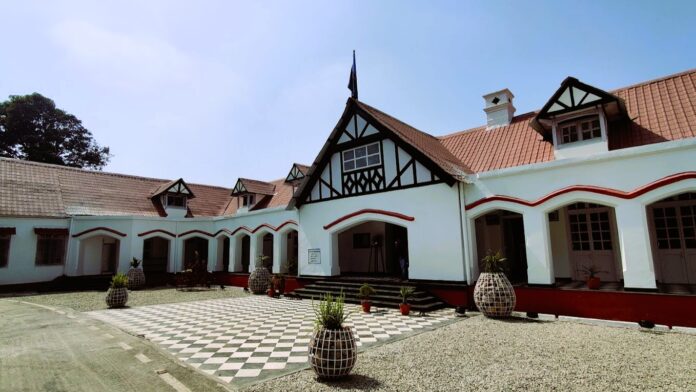Are you ready to venture on a journey that will shape you into a future leader of the Indian Armed Forces? Imagine standing shoulder to shoulder with the bravest and brightest, leading your country into a safer and more secure future. The Rashtriya Indian Military College (RIMC) is where this journey begins.
This guide is your key to unlocking the doors of this prestigious institution, delving into its rich history, uncovering the rigorous admission process, and exploring the unparalleled opportunities that await those who dare to dream big. Are you ready to discover what it takes to become a part of this esteemed legacy?
RIMC History and Establishment
The Rashtriya Indian Military College, originally known as the Prince of Wales Royal Indian Military College, was established in 1922 in Dehradun, Uttarakhand. The institution was founded with the primary goal of providing quality education and military training to Indian youth, preparing them for entry into the prestigious Indian Military Academy (IMA).
Key historical milestones
- 1922: Establishment of the Prince of Wales Royal Indian Military College
- 1947: Renamed as Rashtriya Indian Military College after India’s independence
- 1960: RIMC becomes a feeder institution for the National Defence Academy (NDA)
The college has a rich heritage and has produced numerous distinguished military leaders, including several Army Chiefs, over its century-long existence.
RIMC Admission Process
Gaining admission to RIMC is a competitive process that requires dedication and preparation. Here’s an overview of the admission procedure:
- Eligibility Criteria
- Age: Candidates must be between 11.5 to 13 years as of 1st July of the admission year.
- Education: Studying in or have passed Class VII from a recognized school.
- Application Process
- Applications are typically invited twice a year for January and July sessions.
- Forms can be obtained from the respective State Governments’ Education Departments or the RIMC website.
- Entrance Examination
The entrance exam consists of two stages: a) Written Examination:
- English paper (125 marks)
- Mathematics paper (200 marks)
- General Knowledge paper (75 marks) b) Viva Voce:
- Interview and medical examination for candidates who clear the written test
- Selection
- Final selection is based on the combined performance in the written exam and viva voce.
- Selected candidates are offered admission based on the all-India merit list and state-wise quotas.
Preparation Tips
- Focus on strengthening your basics in English, Mathematics, and General Knowledge.
- Develop good reading habits to improve your language skills and general awareness.
- Practice physical fitness exercises regularly.
- Familiarize yourself with current affairs and basic military knowledge.
Mission and Vision
RIMC’s primary mission is to prepare young cadets for a career in the Indian Armed Forces by providing them with a strong foundation in academics, physical fitness, and character development. The institution aims to mold its students into well-rounded individuals capable of excelling in various aspects of military leadership.
The vision of this institution was to provide Indian boys with suitable education and training to ensure a high pass rate for Indians being sent to the Royal Military College, Sandhurst, as part of the Indianization program of the Officer cadre of the Indian Army.
The institution was run along the lines of an English Public School, as the British believed that a Public School education was necessary for Indian boys to become suitable for the rigors and discipline of army life. The institution grooms young cadets to become selected military leaders of tomorrow and serves as a feeder institution to NDA, NAVAC, and other defense service entry schemes.
Curriculum and Academic Structure
RIMC offers a comprehensive curriculum that balances academic education with military training. The academic program follows the CBSE syllabus and prepares students for the All India Secondary School Examination (Class X) and All India Senior School Certificate Examination (Class XII).
Academic Subjects
- English
- Hindi
- Mathematics
- Science (Physics, Chemistry, Biology)
- Social Sciences (History, Geography, Political Science, Economics)
- Computer Science
- Environmental Studies
Military Training
In addition to academic subjects, cadets receive basic military training, which includes:
- Physical Training (PT) and drill
- Map reading and field craft
- Weapon training (basic concepts)
- Leadership development activities
- Adventure sports (rock climbing, trekking, etc.)
Extracurricular Activities
RIMC places a strong emphasis on holistic development. Cadets are encouraged to participate in various extracurricular activities, including:
- Sports (Athletics, Swimming, Horse Riding, etc.)
- Debates and public speaking
- Cultural programs and competitions
- NCC (National Cadet Corps) activities
- Community service initiatives
Daily Routine
A typical day at RIMC is structured to instill discipline and time management skills:
- 5:30 AM: Wake-up call
- 6:00 AM – 7:30 AM: Physical Training and morning assembly
- 8:00 AM – 1:30 PM: Academic classes
- 2:30 PM – 5:30 PM: Sports and extracurricular activities
- 6:00 PM – 8:00 PM: Self-study time
- 10:00 PM: Lights out
This rigorous schedule helps cadets develop a strong work ethic and prepares them for the demands of a military career.
Facilities and Infrastructure at RIMC
RIMC boasts state-of-the-art facilities to support its comprehensive training program:
- Academic Facilities
- Well-equipped classrooms with modern teaching aids
- Science and computer laboratories
- Library with an extensive collection of books and digital resources
- Sports Facilities
- Multi-purpose sports complex
- Swimming pool
- Horse riding arena
- Athletics track
- Indoor sports hall
- Accommodation
- Comfortable hostels with separate wings for junior and senior cadets
- Mess facilities providing nutritious meals
- Medical Facilities
- On-campus medical center with qualified staff
- Tie-ups with nearby hospitals for specialized care
- Training Areas
- Parade ground
- Obstacle course
- Shooting range (air rifle)
These facilities ensure that cadets have access to the best resources for their academic and physical development.
Career Prospects and Opportunities
RIMC serves as a stepping stone for a career in the Indian Armed Forces. Upon completion of their schooling at RIMC, cadets have several career options:
- National Defence Academy (NDA)
- Most RIMC graduates opt for the NDA entrance exam.
- Successful candidates join the NDA for a 3-year training program.
- Indian Military Academy (IMA)
- After completing their graduation, cadets can apply for the Combined Defence Services (CDS) examination.
- Successful candidates join the IMA for a 1-year training program.
- Other Military Academies
- Cadets can also apply for entry into the Indian Naval Academy or Air Force Academy.
- Civilian Careers
- RIMC’s rigorous education also prepares cadets for civilian careers.
- Many alumni have excelled in fields such as civil services, management, and entrepreneurship.
Success Stories and Notable Alumni
RIMC has produced numerous distinguished military leaders and public figures. Some notable alumni include:
- Gen KS Thimayya: Former Chief of Army Staff
- Gen S Padmanabhan: Former Chief of Army Staff
- Air Chief Marshal N.C. Suri: Former Chief of Air Staff
- Lt. Gen Premindra Singh Bhagat: Recipient of Victoria Cross
- Nishkal Dwivedi: Squash Player
These success stories serve as inspiration for current and future cadets, highlighting the potential for achievement and leadership that RIMC nurtures.
Challenges and Support Systems
While RIMC offers an excellent platform for aspiring military officers, cadets may face certain challenges:
- Rigorous Schedule: The demanding daily routine can be initially overwhelming for some students.
- Academic Pressure: Balancing academics with military training can be challenging.
- Homesickness: Being away from family at a young age can be emotionally taxing.
To address these challenges, RIMC has established robust support systems:
- Mentorship Program: Senior cadets and staff members serve as mentors to juniors.
- Counseling Services: Professional counselors are available to help cadets cope with stress and personal issues.
- Regular Parent-Teacher Meetings: These meetings ensure parents stay informed about their child’s progress.
- Gradual Adaptation: The training program is designed to ease cadets into the rigorous routine gradually.
The Final Note
The Rashtriya Indian Military College offers a unique educational experience that prepares young cadets for a promising career in the Indian Armed Forces. With its rich history, comprehensive curriculum, and focus on character development, RIMC continues to play a crucial role in shaping future military leaders.
If you’re considering a career in the armed forces, RIMC provides an excellent foundation to achieve your goals. The journey may be challenging, but the rewards – in terms of personal growth, leadership skills, and the opportunity to serve the nation – are immeasurable.
We encourage you to explore further, reach out to RIMC alumni, and consider this remarkable institution as a stepping stone to a fulfilling military career.
FAQs
- Q: What is the age limit for RIMC admission?
A: Candidates must be between 11.5 to 13 years as of 1st July of the admission year.
- Q: How often are RIMC admissions conducted?
A: RIMC admissions are typically conducted twice a year for January and July sessions.
- Q: What is the medium of instruction at RIMC?
A: The medium of instruction at RIMC is English.
- Q: Can girls apply to RIMC?
A: As of 2023, RIMC is an all-boys institution. However, discussions about admitting girl cadets are ongoing.
- Q: What are the career options after RIMC?
A: Most RIMC graduates join the National Defence Academy (NDA) or other military academies. Some also pursue civilian careers.






